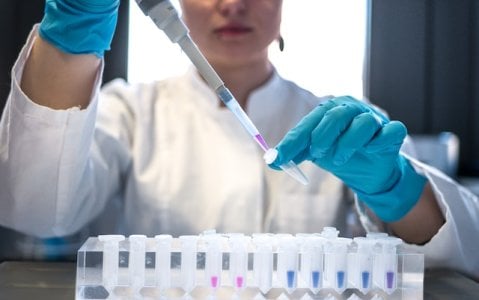Scientists discover surprising illegal party drug might obliterate cancer cells
By
Seia Ibanez
- Replies 8
In the relentless pursuit of a cure for cancer, scientists are exploring every possible avenue, even those that might seem unconventional.
One such path has led researchers to an unexpected potential ally in the war against cancer: Ketamine.
Yes, you read that right. The infamous party drug, often associated with illegal raves and hallucinogenic trips, might just hold the key to a breakthrough in cancer treatment.
Ketamine, known as a horse tranquiliser, has shown promising results in laboratory tests, demonstrating its potential to kill tumour cells. The drug, which is currently illegal in many parts of the world, including Australia, might block a receptor that encourages tumours to grow, according to experts.
The research team at Imperial College London, who conducted the tests, is hopeful that similar results can be replicated in further lab studies and eventually among patients.
However, it's important to note that the journey from lab to bedside is long, often involving years of rigorous testing and trials involving thousands of patients. Therefore, while the initial results are promising, any potential cancer treatment involving ketamine is still years away.
Surgery, chemotherapy, and radiotherapy are the commonly used cancer treatments. However, researchers continue to search for other treatments to increase survival rates.
Scientists at Imperial College London, Hirosaki University, Nippon Medical School in Japan, and the National Clinical Research Center for Child Health in China said that ketamine’s effects on cancer cells were still unclear on whether it could slow their growth and production.
The study, published in the European Journal of Pharmacology, involved exposing human lung and brain cancer cells to different concentrations of Ketamine. The cells, which had been removed from the body and grown in a humidified incubator, were then analysed and compared to control cells that had not been exposed to the drug.

The results were striking. The cancer cells exposed to Ketamine showed a significant reduction in growth and spread, with the most pronounced effect seen in cells exposed to the highest drug dose. Furthermore, there was a significant increase in the number of cells in late apoptosis, a stage where tumours self-destruct.
The researchers believe that Ketamine works by blocking a receptor known as n-methyl-d-aspartate (NMDA), which plays a crucial role in regulating tumour size, spread, and severity.
However, the team also noted that they used 'relatively high' concentrations of Ketamine in the study, and the findings do not necessarily mean the drug would work the same way on patients.
Understanding Ketamine: From Anaesthetic to Party Drug and Potential Cancer Treatment
Ketamine has a complex history. It was developed in the 1960s as a safer alternative to the anaesthetic phencyclidine (PCP), which had a high incidence of severe side effects, including hallucinations. Ketamine quickly became a popular anaesthetic due to its ability to induce a trance-like state while maintaining heart rate and blood pressure.
However, by the late 1990s, Ketamine had found its way out of the operating room and onto the party scene. Known by street names such as Special K, Ket, or Kit Kat, it became popular for its hallucinogenic effects.
Despite its illegal status and potential side effects, including vivid dreams, mood swings, and in rare cases, seizures, Ketamine continues to be used recreationally.
The Dark Side of Ketamine
While the potential benefits of Ketamine are exciting, it's important to remember that this drug also has a dark side. In October, Friends star Matthew Perry died due to the 'acute effects' of Ketamine. He was found with similar quantities of the drug in his system as a hospital patient under general anaesthetic.
According to the Alcohol and Drug Foundation, the number of individuals in Australia who recently engaged in ketamine use saw a twofold increase between 2016 and 2019, escalating from 0.4 per cent to 0.9 per cent of the population.
The demographic most inclined towards ketamine usage comprises individuals in their twenties.
Throughout the COVID-19 lockdowns in 2020-21, there was a notable surge of 21 per cent in ketamine consumption among individuals who habitually partake in drug use.
Furthermore, ketamine use in Australia has risen due to the cost of living crisis. According to the report of the Australian Criminal Intelligence Commission (ACIC), record-high ketamine use was seen in cities and regions, with higher consumption in capitals than in regional areas in April 2023.
The rise of modern technology created avenues for researchers and scientists alike to improve Australia’s healthcare system and add more treatments for patients.
In a similar story, doctors in the United Kingdom discovered an immunotherapy drug that could destroy cancers in the lower part of the bowel without undergoing an operation in some rectal cancer patients.
For lung cancer patients, another drug was proven to cut the risk of the disease by more than 70 per cent and can reduce the likelihood of dying within five years of treatment by half. Read more about the discovery here.

What are your thoughts on this surprising development? Have you or a loved one been affected by cancer and considered unconventional treatments? Share your thoughts and experiences with us in the comments below.
One such path has led researchers to an unexpected potential ally in the war against cancer: Ketamine.
Yes, you read that right. The infamous party drug, often associated with illegal raves and hallucinogenic trips, might just hold the key to a breakthrough in cancer treatment.
Ketamine, known as a horse tranquiliser, has shown promising results in laboratory tests, demonstrating its potential to kill tumour cells. The drug, which is currently illegal in many parts of the world, including Australia, might block a receptor that encourages tumours to grow, according to experts.
The research team at Imperial College London, who conducted the tests, is hopeful that similar results can be replicated in further lab studies and eventually among patients.
However, it's important to note that the journey from lab to bedside is long, often involving years of rigorous testing and trials involving thousands of patients. Therefore, while the initial results are promising, any potential cancer treatment involving ketamine is still years away.
Surgery, chemotherapy, and radiotherapy are the commonly used cancer treatments. However, researchers continue to search for other treatments to increase survival rates.
Scientists at Imperial College London, Hirosaki University, Nippon Medical School in Japan, and the National Clinical Research Center for Child Health in China said that ketamine’s effects on cancer cells were still unclear on whether it could slow their growth and production.
The study, published in the European Journal of Pharmacology, involved exposing human lung and brain cancer cells to different concentrations of Ketamine. The cells, which had been removed from the body and grown in a humidified incubator, were then analysed and compared to control cells that had not been exposed to the drug.

Scientists from several universities conducted a study on the effects of ketamine on cancer cells. Credit: Unsplash
The results were striking. The cancer cells exposed to Ketamine showed a significant reduction in growth and spread, with the most pronounced effect seen in cells exposed to the highest drug dose. Furthermore, there was a significant increase in the number of cells in late apoptosis, a stage where tumours self-destruct.
The researchers believe that Ketamine works by blocking a receptor known as n-methyl-d-aspartate (NMDA), which plays a crucial role in regulating tumour size, spread, and severity.
However, the team also noted that they used 'relatively high' concentrations of Ketamine in the study, and the findings do not necessarily mean the drug would work the same way on patients.
Understanding Ketamine: From Anaesthetic to Party Drug and Potential Cancer Treatment
Ketamine has a complex history. It was developed in the 1960s as a safer alternative to the anaesthetic phencyclidine (PCP), which had a high incidence of severe side effects, including hallucinations. Ketamine quickly became a popular anaesthetic due to its ability to induce a trance-like state while maintaining heart rate and blood pressure.
However, by the late 1990s, Ketamine had found its way out of the operating room and onto the party scene. Known by street names such as Special K, Ket, or Kit Kat, it became popular for its hallucinogenic effects.
Despite its illegal status and potential side effects, including vivid dreams, mood swings, and in rare cases, seizures, Ketamine continues to be used recreationally.
The Dark Side of Ketamine
While the potential benefits of Ketamine are exciting, it's important to remember that this drug also has a dark side. In October, Friends star Matthew Perry died due to the 'acute effects' of Ketamine. He was found with similar quantities of the drug in his system as a hospital patient under general anaesthetic.
According to the Alcohol and Drug Foundation, the number of individuals in Australia who recently engaged in ketamine use saw a twofold increase between 2016 and 2019, escalating from 0.4 per cent to 0.9 per cent of the population.
The demographic most inclined towards ketamine usage comprises individuals in their twenties.
Throughout the COVID-19 lockdowns in 2020-21, there was a notable surge of 21 per cent in ketamine consumption among individuals who habitually partake in drug use.
Furthermore, ketamine use in Australia has risen due to the cost of living crisis. According to the report of the Australian Criminal Intelligence Commission (ACIC), record-high ketamine use was seen in cities and regions, with higher consumption in capitals than in regional areas in April 2023.
The rise of modern technology created avenues for researchers and scientists alike to improve Australia’s healthcare system and add more treatments for patients.
In a similar story, doctors in the United Kingdom discovered an immunotherapy drug that could destroy cancers in the lower part of the bowel without undergoing an operation in some rectal cancer patients.
For lung cancer patients, another drug was proven to cut the risk of the disease by more than 70 per cent and can reduce the likelihood of dying within five years of treatment by half. Read more about the discovery here.
Key Takeaways
- Ketamine, an anaesthetic and illegal party drug, has shown promise in laboratory tests for killing tumour cells in brain and lung cancer.
- Researchers believe ketamine could help in the fight against cancer by potentially blocking a receptor that promotes tumour growth.
- Despite promising lab results, in-depth studies and clinical trials involving cancer patients are required before ketamine can be considered a viable cancer treatment.
- Ketamine's effects on humans as a cancer treatment are not yet clear, and further research is essential to determine its efficacy and safety in this new role.








